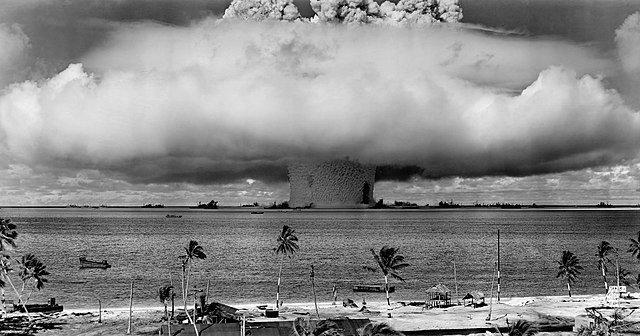The United States may be forced to expand its nuclear weapons arsenal in the coming years to deter growing threats from Russia, China, and North Korea, according to a stark warning from Pranay Vaddi, Special Assistant to the President and Senior Director for Arms Control at the White House.
In a speech to the Arms Control Association on Friday, Vaddi outlined a policy shift aimed at pressing Moscow and Beijing to reverse their rejections of U.S. calls for arsenal limitation talks.
"Absent a change in adversary arsenals, we may reach a point in the coming years where an increase from current deployed numbers is required. We need to be fully prepared to execute if the president makes that decision," Vaddi said. "If that day comes, it will result in a determination that more nuclear weapons are required to deter our adversaries and protect the American people and our allies and partners."
Vaddi's comments come amid growing tensions between the U.S. and both Russia and China, sparking fears of an all-out war. In May, Russia conducted tactical nuclear weapons drills "in response to provocative statements and threats by individual Western officials," while hosts and guests on Russian state TV have repeatedly threatened nuclear strikes on Western powers, including the U.S., France, the U.K., and the Netherlands.
The U.S. currently observes a limit of 1,550 deployed strategic nuclear warheads set in the 2010 New START treaty with Russia, despite Moscow's "suspension" of its participation last year over U.S. support for Ukraine. Vaddi's speech marks a shift from National Security Adviser Jake Sullivan's remarks to the same group a year ago, in which he stated there was no need to increase U.S. strategic nuclear arms deployments to counter the arsenals of Russia and China.
Vaddi warned that Russia, China, and North Korea "are all expanding and diversifying their nuclear arsenals at a breakneck pace, showing little or no interest in arms control." He also claimed that these three powers, along with Iran, are "increasingly cooperating and coordinating with each other in ways that run counter to peace and stability, threaten the United States, our allies and our partners and exacerbate region tensions," including by sharing advanced missile and drone technology.
According to Statista figures for January 2023, Russia had the largest nuclear arsenal in the world with 5,889 warheads, followed by the U.S. with 5,244. China had 410 warheads but is rapidly expanding its arsenal, while American allies France and the U.K. had 290 and 225 nuclear warheads, respectively.
On Wednesday, Russian President Vladimir Putin warned he could deploy conventional missiles within range of Western powers after a number of these gave Ukraine permission to hit Russian military targets on its own soil with their weapons for the first time. However, on Friday, Putin said Russia had no need to use nuclear weapons to secure victory in Ukraine.
U.S. nuclear doctrine, Vaddi said, reserves nuclear weapons to deterring attacks by adversaries "on us and our allies and partners," while remaining committed with Britain and France to "transparency" on nuclear policies and forces. However, if U.S. adversaries boost reliance on nuclear weapons, "we will have no choice but to adjust our posture and capabilities to preserve deterrence and stability," he said.
During an interview with Fox News host Sean Hannity on Thursday morning, Donald Trump, the presumptive 2024 Republican presidential nominee, claimed that nuclear war is a bigger threat to the U.S. than climate change.
"This is obliteration, maybe world obliteration, and we have a man is not capable of discussing it. The only global warming that matters to me is nuclear global warming. Because that's the real deal," Trump said.






